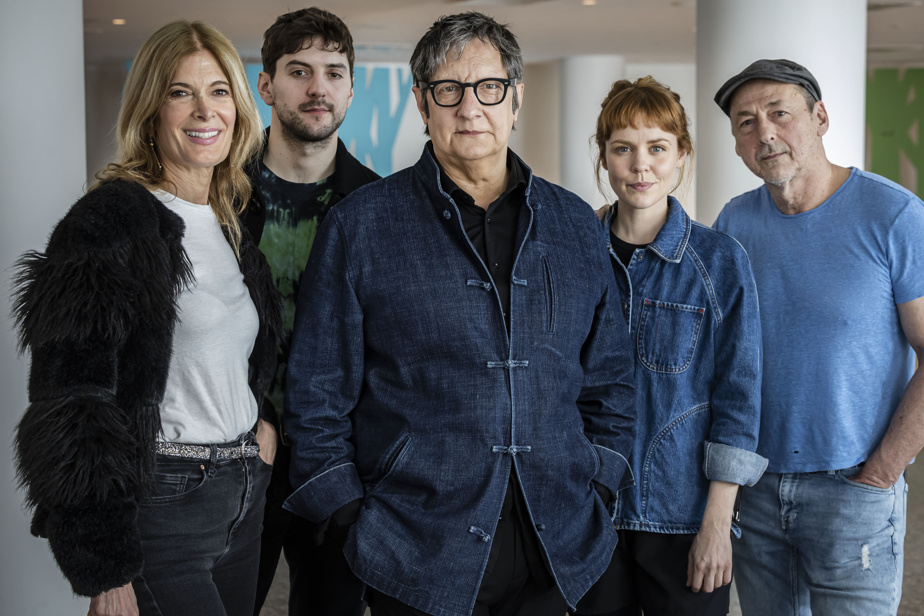Ex Machina’s new show will make way for the magic of the director to illustrate an important period in the history of modern Quebec. La Presse spoke with Robert Lepage about the Riopelle Project, behind the scenes at Duceppe.
Last week, Robert Lepage sat down with the Montreal media to talk about his latest baby, The Riopelle Project, along with the lead performers from the creation of Ex Machina. At 10 days from the premiere, the director is not yet fixed on the duration of the show. And he can’t wait to get back to rehearsals with his production team.
“Robert [Lepage]’s shows move up to the very last minute…and even after their premieres. Meeting the public is therefore essential,” explains actress Anne-Marie Cadieux, who performed around the world in the first version of Seven Branches of the Ôta River.
Robert Lepage has agreed to embark on the adventure of a new river show, for reasons that relate to a triple anniversary in 2023: the 100th of the birth of Jean Paul Riopelle, on October 7; the 50th of the creation of the Compagnie Jean Duceppe; and the 75th anniversary of Refus global.
To paraphrase Refus global, of which Riopelle is one of the signatories, Robert Lepage constantly pushes the boundaries of our dreams in the theater. No one will be surprised that after Leonardo da Vinci, Cocteau and Sade, the creator was seduced by another historical figure. “At the same time as we approach the intimate history of Riopelle, we also speak of History with a capital H, explains Lepage. Modern Quebec did not begin with the Quiet Revolution. Modernity arrived before 1960, with Riopelle, Borduas and a few others before them. »
Eventually, the pandemic will have had something good. By confining Robert Lepage to his home in Quebec, it allowed him to do tons of research on Jean Paul Riopelle and the artists of that time. “Indeed, it’s one of the most documented shows I’ve worked on in my career,” he says. Three years of research. In the theatre, it is difficult to sum up such a complex and mysterious man and artist. »
Because Riopelle gave up little on his life and his work. In order not to betray the memory of the artist or create a fictional character far from reality, Lepage and his collaborators drew on the testimonies of friends and relatives. “Luckily, people back then were very fond of writing letters,” says Lepage. And Olivier Kemeid went through Riopelle’s correspondence to write the dialogues for the play. All of the lines were said somewhere in his lifetime. »
Riopelle seen by Lepage is also the story of a Quebecer who moved to Europe in his early twenties. And who returns to Quebec after having enjoyed success in France, without ever denying his roots. On his way, the artist meets key figures in the history of art: Beckett, Breton, Giacometti, in Europe; Barbeau, Mousseau, Gauvreau, and also Marcelle Ferron, Françoise Sullivan, in Quebec. Without omitting his love life, the women in his life, including Joan Mitchell (played in two parts by Anne-Marie Cadieux and Noémie O’Farrell). Riopelle had a tormented and passionate relationship with the famous American painter for 24 years.
We follow Riopelle from 1942, when the young man arrived at the École du Meubles de Montréal, in Borduas’ master class, until shortly before his death. A fresco à la Lepage, covering more than half a century and taking place through several places, with as common thread The homage to Rosa Luxembourg, Riopelle’s testament work that he will dedicate to Joan Mitchell in 1992.
Over time, Riopelle changed his style. His art is constantly evolving. Is it important for an artist to renew themselves in a career?
The show will also address this explosive manifesto. A founding text and still as relevant, according to Lepage. “Without generalizing, this censorship of a well-meaning elite denounced by the Automatistes, it looks like another censorship of our time with wokism, the culture of cancellation. Because in 1948, it wasn’t just the Catholic clergy and Duplessis that stood in the way of having a conversation with artists with new and different ideas. »
Gabriel Lemire and Luc Picard will play Riopelle at different periods of his life: “It is interesting and dramatically beautiful that Luc plays both the master [Borduas] and the pupil [Riopelle, older]. We see the young man becoming the father figure,” comments Anne-Marie Cadieux.
“The master is the person who teaches you, but it is also the one who frees you, validates your talent, adds Lepage. At 17, when I entered the Quebec Conservatory of Dramatic Arts, I was sure that the management would kick me out after a year! However, Marc Doré [the director from 1978 to 1988] saw things in me that I did not suspect. However, after a few years, I broke up with my master. At some point, for a young artist to exist, he must kill the master and eat him! »
There is no creation without freedom. This was true in the 1940s and 1950s. And it is still true today.
